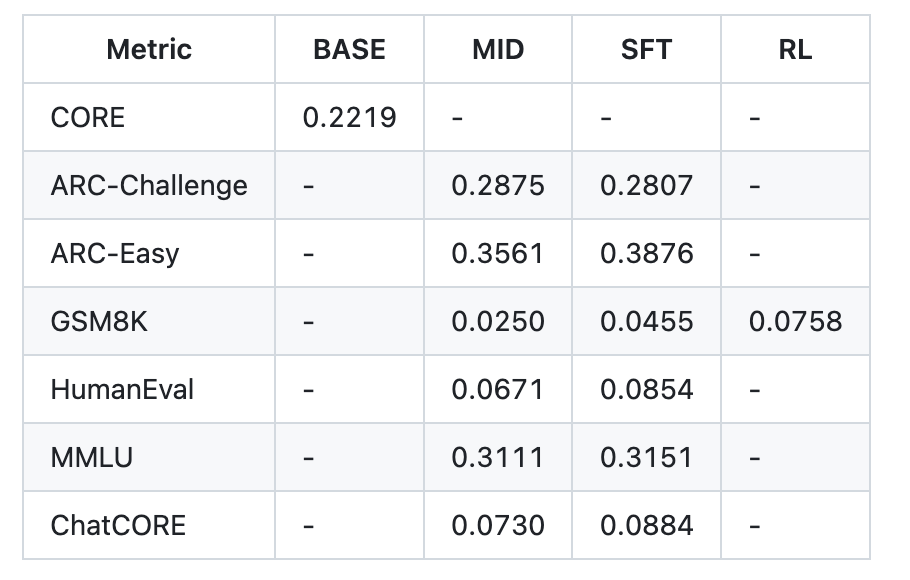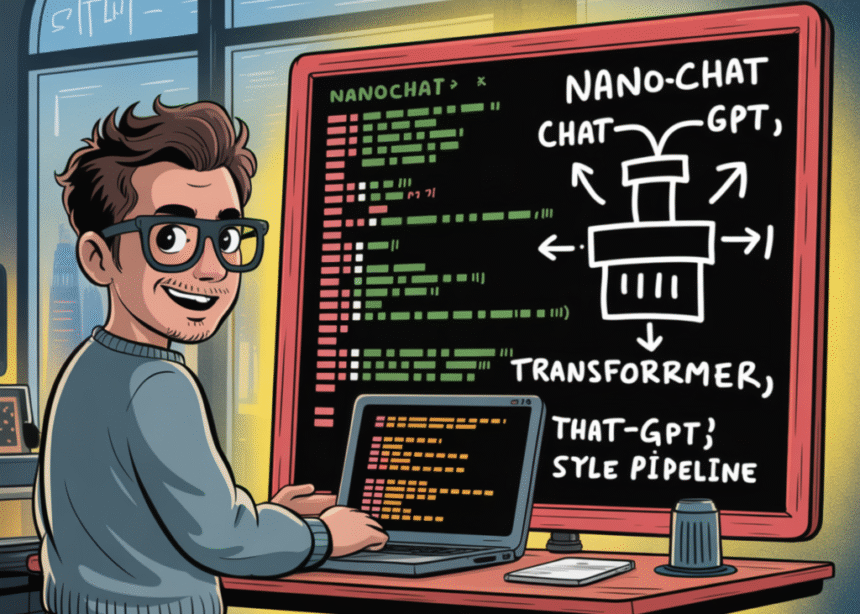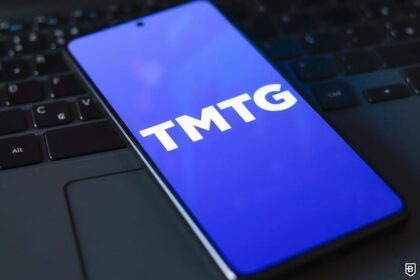Andrej Karpathy has open-sourced nanochat, a compact, dependency-light codebase that implements a full ChatGPT-style stack—from tokenizer training to web UI inference—aimed at reproducible, hackable LLM training on a single multi-GPU node.
The repo provides a single-script “speedrun” that executes the full loop: tokenization, base pretraining, mid-training on chat/multiple-choice/tool-use data, Supervised Finetuning (SFT), optional RL on GSM8K, evaluation, and serving (CLI + ChatGPT-like web UI). The recommended setup is an 8×H100 node; at ~$24/hour, the 4-hour speedrun lands near $100. A post-run report.md summarizes metrics (CORE, ARC-E/C, MMLU, GSM8K, HumanEval, ChatCORE).
Tokenizer and data path
- Tokenizer: custom Rust BPE (built via Maturin), with a 65,536-token vocab; training uses FineWeb-EDU shards (re-packaged/shuffled for simple access). The walkthrough reports ~4.8 characters/token compression and compares against GPT-2/4 tokenizers.
- Eval bundle: a curated set for CORE (22 autocompletion datasets like HellaSwag, ARC, BoolQ, etc.), downloaded into
~/.cache/nanochat/eval_bundle.
Model, scaling, and “speedrun” target
The speedrun config trains a depth-20 Transformer (≈560M params with 1280 hidden channels, 10 attention heads of dim 128) for ~11.2B tokens consistent with Chinchilla-style scaling (params × ~20 tokens). The author estimates this run as a ~4e19 FLOPs capability model. Training uses Muon for matmul parameters and AdamW for embeddings/unembeddings; loss is reported in bits-per-byte (bpb) to be tokenizer-invariant.
Mid-training, SFT, and tool use
After pretraining, mid-training adapts the base model to conversations (SmolTalk) and explicitly teaches multiple-choice behavior (100K MMLU auxiliary-train questions) and tool use by inserting <|python_start|>…<|python_end|> blocks; a small GSM8K slice is included to seed calculator-style usage. The default mixture: SmolTalk (460K), MMLU aux-train (100K), GSM8K main (8K), totaling 568K rows.
SFT then fine-tunes on higher-quality conversations while matching test-time formatting (padded, non-concatenated rows) to reduce train/inference mismatch. The repo’s example post-SFT metrics (speedrun tier) report ARC-Easy 0.3876, ARC-Challenge 0.2807, MMLU 0.3151, GSM8K 0.0455, HumanEval 0.0854, ChatCORE 0.0884.
Tool use is wired end-to-end: the custom Engine implements KV cache, prefill/decode inference, and a simple Python interpreter sandbox for tool-augmented runs—used in both training and evaluation flows.
Optional RL on GSM8K via a simplified GRPO loop
The final (optional) stage applies reinforcement learning on GSM8K with a simplified GRPO routine. The walkthrough clarifies what’s omitted relative to canonical PPO-style RLHF: no trust region via a reference model, no KL penalties, on-policy updates (discard PPO ratios/clip), token-level GAPO-style normalization, and mean-shift advantage. Practically, it behaves close to REINFORCE while keeping the group-relative advantage calculation. Scripts scripts.chat_rl and scripts.chat_eval -i rl -a GSM8K demonstrate the loop.
Cost/quality scaling and bigger models
The README sketches two larger targets beyond the ~$100 speedrun:
- ~$300 tier: d=26 (~12 hours), slightly surpasses GPT-2 CORE; requires more pretraining shards and batch-size adjustments.
- ~$1,000 tier: ~41.6 hours, with materially improved coherence and basic reasoning/coding ability.
The repo also note prior experimental runs where a d=30 model trained for ~24 hours reached 40s on MMLU, 70s on ARC-Easy, 20s on GSM8K.
Evaluation snapshot (speedrun tier)
An example report.md table for the ~$100/≈4-hour run shows: CORE 0.2219 (base); after mid-training/SFT, ARC-E 0.3561→0.3876, ARC-C ~0.2875→0.2807, MMLU 0.3111→0.3151, GSM8K 0.0250→0.0455, HumanEval 0.0671→0.0854, ChatCORE 0.0730→0.0884; wall-clock 3h51m.


Key Takeaways
- nanochat is a minimal, end-to-end ChatGPT-style stack (~8K LOC) that runs via a single
speedrun.shon one 8×H100 node (~4h ≈ $100). - The pipeline covers tokenizer (Rust BPE), base pretraining, mid-training, SFT, optional RL on GSM8K (simplified GRPO), evaluation, and serving (CLI + Web UI).
- Speedrun metrics (example
report.md): CORE 0.2219 base; after SFT—ARC-Easy 0.3876, ARC-Challenge 0.2807, MMLU 0.3151, GSM8K 0.0455, HumanEval 0.0854. - Scaling tiers are outlined: ~$300 (d=26, ~12h) “slightly outperforms GPT-2 CORE”; ~$1,000 (~41.6h) for materially better coherence/reasoning.
Karpathy’s nanochat lands in a useful middle ground: a single, clean, dependency-light repository that stitches tokenizer training (Rust BPE), pretraining on FineWeb-EDU, mid-training (SmolTalk/MMLU aux/GSM8K with tool use tags), SFT, optional simplified GRPO on GSM8K, and a thin Engine (KV cache, prefill/decode, Python interpreter) into a reproducible speedrun on an 8×H100 node, producing a traceable report.md with CORE/ARC/MMLU/GSM8K/HumanEval and a minimal Web UI.
Check out the Technical details and Codes. Feel free to check out our GitHub Page for Tutorials, Codes and Notebooks. Also, feel free to follow us on Twitter and don’t forget to join our 100k+ ML SubReddit and Subscribe to our Newsletter. Wait! are you on telegram? now you can join us on telegram as well.
Asif Razzaq is the CEO of Marktechpost Media Inc.. As a visionary entrepreneur and engineer, Asif is committed to harnessing the potential of Artificial Intelligence for social good. His most recent endeavor is the launch of an Artificial Intelligence Media Platform, Marktechpost, which stands out for its in-depth coverage of machine learning and deep learning news that is both technically sound and easily understandable by a wide audience. The platform boasts of over 2 million monthly views, illustrating its popularity among audiences.









